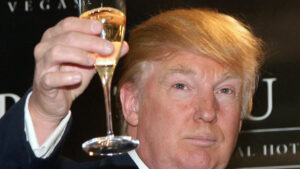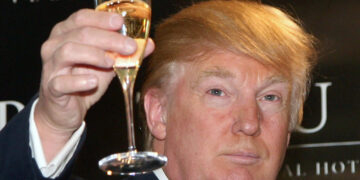
Washington — President Donald Trump has threatened to impose a 200% tariff on European wine and Champagne, escalating trade tensions with the European Union. The move comes in response to the EU’s decision to increase tariffs on American whiskey to 50%.
In a post on Truth Social, Trump announced that if the EU does not remove its tariff immediately, the U.S. will retaliate by placing a 200% tariff on all wines, Champagnes, and alcoholic beverages from France and other EU nations. He claimed that this measure would benefit the U.S. wine industry.
Trade War Escalates Between U.S. and EU
Trump criticized the European Union, calling it “one of the most hostile and abusive taxing and tariffing authorities in the world.” This latest move follows his decision to increase tariffs on all steel and aluminum imports to 25%, triggering EU retaliation.
European Commission President Ursula von der Leyen responded on Wednesday, stating that the EU’s countermeasures are worth €26 billion ($28 billion). The new tariffs, set to begin on April 1, 2025, will target key U.S. exports, including:
- Beef and poultry
- Bourbon
- Jeans
- Peanut butter
Von der Leyen criticized the tariffs, warning that they disrupt supply chains, hurt businesses, and drive up consumer prices.
How the Tariffs Impact the Wine Industry
According to the U.S. Department of Agriculture, the U.S. imported $4.9 billion worth of wine in 2023, with France and Italy as the top suppliers. American wine exports totaled $1.2 billion last year, with over $167 million going to the EU.
Champagne, a sparkling wine produced exclusively in the Champagne region of France, is a key export at risk. If produced outside this region, the drink is labeled as sparkling wine instead.
Whiskey Industry Responds to Tariffs
The Distilled Spirits Council, which represents U.S. whiskey producers, called the EU’s tariff hike on American whiskey “deeply disappointing”. CEO Chris Swonger warned that these measures will curtail growth, impact U.S. farmers, and hurt distillers nationwide.
The trade group reported that a 2018 retaliatory tariff under Trump’s first term led to a 20% drop in U.S. whiskey exports. However, exports to the EU rebounded nearly 60% from $439 million in 2021 to $699 million in 2024.
Trump’s Tariff Strategy and Economic Concerns
Since returning to the White House for a second term, Trump has made tariffs a cornerstone of his economic policy. However, these trade measures have raised concerns over a potential U.S. recession.
Commerce Secretary Howard Lutnick defended Trump’s policies in an interview with CBS News, stating, “These policies produce revenues, growth, and factories being built here.” He dismissed concerns about a recession, blaming past Biden administration policies for economic uncertainty.
Broader Trade War: China, Canada, and Mexico
Trump’s trade war expanded this month with new tariffs on:
- Canada and Mexico: 25% tariffs on imports
- China: 10% tax on select goods
Beijing responded with retaliatory tariffs on U.S. agricultural products, affecting farmers with new levies on soybeans, pork, beef, and fruit.
However, Trump paused tariffs on Mexican and Canadian goods covered under the USMCA trade deal until April 2. Additionally, U.S. automakers received a one-month exemption from tariffs on vehicle parts from Canada, Mexico, and China.
With tensions rising, both the U.S. and EU face mounting pressure to negotiate a resolution before these tariffs take full effect.















































